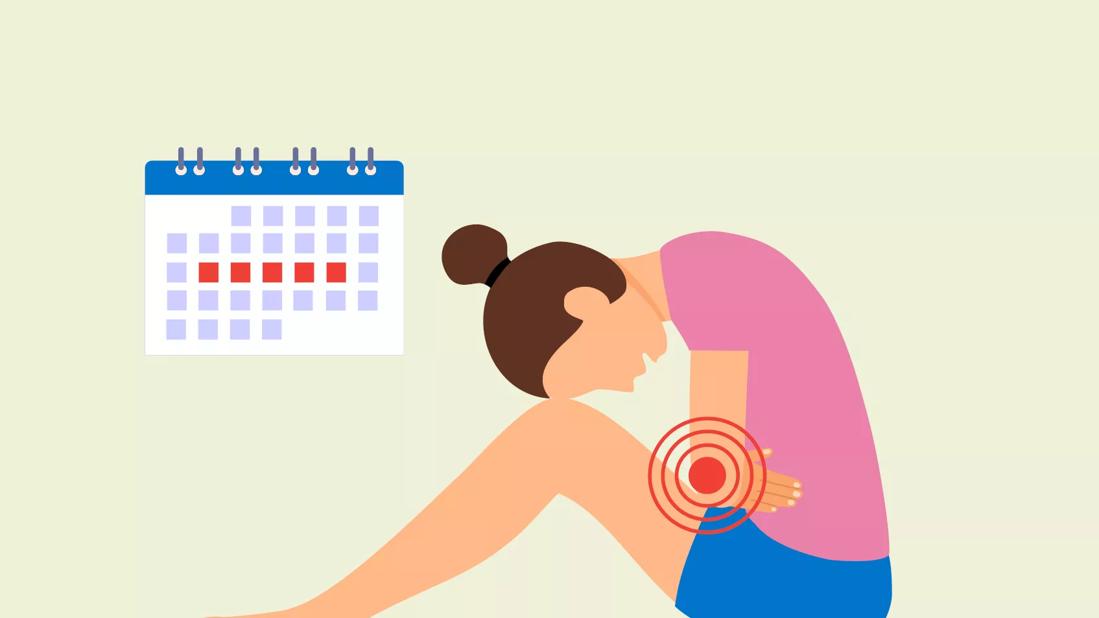They can happen whether you’re having a period or not

Ahh, it’s that time of the month again… Or is it? If you’ve spent your whole life associating having cramps with being on your period, perimenopause may throw you for a loop.
Advertisement
Cleveland Clinic is a non-profit academic medical center. Advertising on our site helps support our mission. We do not endorse non-Cleveland Clinic products or services. Policy
Sometimes, perimenopause cramps are associated with a period; sometimes, they’re not. But either way, they’re a pain. So, what’s a perimenopausal person to do?
Women’s health specialist Alexa Fiffick, DO, explains why you may have such bad cramps during this time and, most importantly, what you can do to relieve them.
Perimenopause is that party guest who bursts onto the scene bearing gifts you didn’t register for — including cramps — whether you’re on your period or not.
Also known as the “menopausal transition,” perimenopause is the time leading up to menopause. When you’ve gone a full 12 months without having your period, you’ve entered menopause — but before then, your period may be unpredictable, coming more or less often than usual. That’s perimenopause.
“Your menstrual cycles start becoming irregular, often shortening or lengthening by a week or more between cycles, and sometimes skipping a cycle,” Dr. Fiffick explains. This stage can last for a few years until you’ve gone 12 months in a row without a period; this means you’ve reached menopause.
During regular menstrual cycles, your estrogen levels decline after you’ve ovulated. During perimenopause, though, your estrogen levels may remain high after ovulation because of changes that your reproductive system is going through. High levels of estrogen can cause your body to release prostaglandins, or chemicals that make your uterus contract — also known as having cramps.
Advertisement
“Perimenopausal hormone fluctuations can worsen your familiar, underlying premenstrual and menstrual symptoms,” Dr. Fiffick says. “And sometimes, patients experience new symptoms that they previously didn’t have.”
That means that even if you’ve never had to deal with period cramps in the past, you may start to experience them in perimenopause. And they may not even be accompanied by a period.
Cramping without a period is called secondary dysmenorrhea, and yes, it’s a possible symptom of perimenopause. Some people describe this sensation as “ovary pain.”
“Fluctuations in your hormones and cycle length can cause irregular ovulation up until you reach menopause,” Dr. Fiffick says. “When your hormones no longer follow the monthly pattern that you were accustomed to in your premenopausal years, you might experience cramping that’s not accompanied by bleeding.”
And if you’ve always gotten period-related cramps, those, too, may get worse during perimenopause. Cramps related to your period are called primary dysmenorrhea, and again, hormonal changes can make them worse.
Many women have an underlying condition called adenomyosis that can cause both primary and secondary dysmenorrhea, along with heavy bleeding. Other conditions like fibroids, endometriosis and ovarian cysts can also cause pain and bleeding that worsens in perimenopause because of hormonal fluctuations.
If perimenopause is making your cramps feel crampier, or if you’re just now experiencing them for the first time, you may feel desperate to alleviate the pain. Here are some tips for finding sweet relief.
Dr. Fiffick recommends nonsteroidal anti-inflammatory medications (known as NSAIDs), for addressing pain and inflammation. Ibuprofen (sold as Advil® or Motrin®) and naproxen (Aleve®) are best.
“They can be very helpful for cramping pain, particularly when you take them at the first onset of your symptoms,” she adds.
Hormonal birth control can help regulate some of the hormonal issues and symptoms that you experience during perimenopause.
“Birth control with certain combined hormonal formulations (including both estrogen and progestin) and progestin IUDs can be used specifically to treat cramping,” Dr. Fiffick says. And if you have endometriosis or adenomyosis, a levonorgestrel-containing IUD may help control your symptoms, especially if you’re hoping to avoid a hysterectomy.
Hitting the gym might be the last thing on your mind when cramps hit, but increased movement can actually decrease your pain.
Even light exercise, like walking or swimming, can get your blood circulating and your endorphins pumping. Endorphins, sometimes known as “feel-good” chemicals, are our body’s natural pain relievers.
Advertisement
“Other methods to control pain include heating pads, acupuncture, relaxation techniques, and meditation,” Dr. Fiffick says.
Just steer clear of over-the-counter supplements and vitamins that claim to help with cramping pain. They’re not regulated by the U.S. Food and Drug Administration (FDA) and can actually cause more issues than they supposedly cure.
Period or no period, you don’t have to put up with cramping pain. But only a trained healthcare provider can help you identify the source of your cramps and determine the right course of treatment for you.
“Any new or worsening cramping should be discussed with a trusted medical professional,” Dr. Fiffick stresses, “especially because an overproduction of estrogen can lead to a variety of new or worsening health issues.” They could include:
Plus, period-free cramps aren’t always purely related to perimenopause. Both primary and secondary dysmenorrhea can also be caused by reproductive-related disorders and infections. You may also be more prone to cramps that aren’t associated with bleeding if you have an IUD that contains progestin, have a history of endometrial ablation or even have had a hysterectomy. Because IUDs and certain procedures often lead to a lack of menstrual bleeding, it’s important to seek care for changing or worsening cramps, regardless of whether you experience bleeding changes.
Advertisement
“Discussing your symptoms with your healthcare clinician is crucial to rule out other underlying conditions, especially if they’re affecting your quality of life,” Dr. Fiffick says.
Advertisement
Learn more about our editorial process.
Advertisement

Estrogen loss contributes to bone loss, which significantly raises your risk of osteopenia and osteoporosis

Making certain changes to your diet, sleep habits and even your wardrobe may help lessen the impact of menopause symptoms

A women’s health specialist explains those cold flashes that come on quickly

Changing hormone levels can bring issues like brittle nails, indigestion, dry skin and new allergies (to name a few!)

The choices you make at mealtime could reduce hot flashes or make them worse

If you’ve noticed changes in your mood and mental health while going through menopause, you’re not alone

Missed periods, heavy periods, painful sex and frequent hot flashes are just a few symptoms worth discussing with your provider

At-home tests measure FSH levels in urine, but they can’t actually diagnose menopause

Wearing a scarf, adjusting your outdoor activities and following your asthma treatment plan can help limit breathing problems

Your diet in the weeks, days and hours ahead of your race can power you to the finish line

When someone guilt trips you, they’re using emotionally manipulative behavior to try to get you to act a certain way